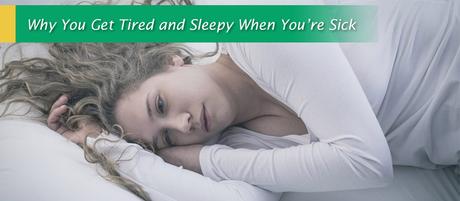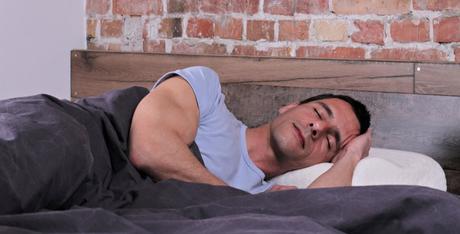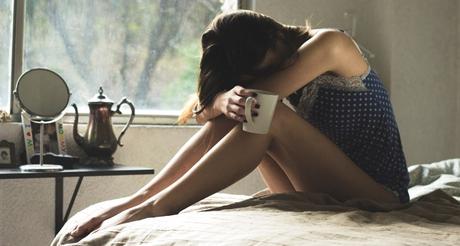We have all been sick at one time or another, and we have all felt totally washed out and badly in need of sleep. Why is this? Why do you want nothing but to go to bet when you feel ill? A study has revealed scientific reasons why you get tired and sleepy when you're sick. Why illness and rest go hand in hand, and why the need for sleep and rest is so common in people when they feel unwell.

Work on Roundworms and Fruit Flies
In January 2017, eLife Sciences Publications published a study carried out on parasitic roundworms. When subject to stress, roundworms emit certain chemicals that send them to sleep. One of these chemicals is known as FLP-13, and it was shown that even when not sick, worms exposed to FLP-13 fell asleep. After some work, it was found that a receptor protein known as DMSR-1 was necessary for the FLP-13 to cause sleep. A similar result was obtained using fruit flies rather than roundworms.
Further work is required to establish whether or not a similar mechanism triggers sleep in humans who are ill. If that is the case, then it may be possible to develop a medication that treats people who suffer fatigue associated with sickness. It may also help those who feel tired and sleepy for unexplained reasons. It is not yet known whether the chemical involved turns off cells that cause people to be awake turns on cells that cause them to sleep. The type of sleep involved in sickness is believed to be different from normal sleep.
Sleep Improves Tissue Repair and the Immune System
During sleep, your body repairs issues and restores cells lost during waking hours. This is also a time when the brain processes memories and other information. Research carried out during the past 15 years has indicated that feeling sleepy when you're sick may help the body to maximize immunity and enhance the body's immune system. This goes along with the popular belief that sleep assists in healing, and if you are feeling ill, your body forces you to feel tired and sleep to help you get better.

That's not all your body is doing to help it heal itself. As it slows you down, makes you feel sleepy and even makes you fall asleep, your body is carrying out some essential tasks to battle your illness.
- It identifies and recognizes the invading bacteria or virus and gets ready to fight them. This is known as the 'encoding' process.
- It gets all the information on these invaders together and consolidates it.
- It stores this information and recalls it the next time the same bacteria or virus returns. This is how people become immune to getting the same viruses multiple times. It's why once you have chickenpox or mumps, you will never get it again. Your body has developed antibodies to fight them, and this is largely done when you are asleep.
It is possible for your body to carry out these functions while you are awake, but they are much more effective when carried out while you are asleep. That's why your body tells you to slow right down until you are asleep rather than try to stay awake and 'man it out.' Manning it out may make you feel even worse because your defenses are not being given the time to recover and build up again. Most of the recovery, healing, and restoration of damage, both mental and physical, takes place during slow-wave sleep when you are sleeping the deepest.
It's not only humans that do this though. Many other animals appear to get sleepy when they are unwell. Some stop eating, others slow down their movements and respond less to their environment than they normally do. From roundworms to humans, it appears as though the organism knows when it is not functioning properly (when it is ill) and slows everything down to a sleeping state. Then it can get to work on healing itself. That's why you get tired and sleepy when you're sick.
How Does Your Body Fight Sickness?
So how does your body fight sickness? What is the process - what are the steps it takes? Slowing you down and making you feel sleepy is the initial step. From the work on the roundworms and fruit flies, it appears to do this by emitting certain chemicals that block the cells that keep you awake (or activate the cells that make you fall asleep).

This has a number of effects on your body. First, your immune system is strengthened and begins fighting off invading bacteria (germs) or viruses. This helps you recover more quickly than you would have otherwise (if at all!). Another effect is to stop all exercise, slow down digestion, and focusing blood flow on providing energy and nutrition to the immune system to help beat off the invaders. Sleeping also generates an increased level of alpha-lipoic acid, a powerful antioxidant that destroys free radicals and other invaders, and so promotes healing.
In this way, your body and its immune system fight infection and promotes healing. This is all helped by sleep, and it is essential to get enough sleep when you are sick. This is why you feel tired and sleepy when sick. Your own body is controlling the process.
Effect of Sleep on the Immune System
Without control, your immune system can lead to inflammation. The adrenal glands, situated at the top of each kidney, produce steroids known as endogenous steroids. These have the effect of suppressing the immune system and reducing inflammation. However, what we need here is to reduce the activity of the adrenal glands, thus allowing an inflammatory response to take place which in turn stimulates the immune system. By falling asleep, you reduce the activity of endogenous steroids and improve the effectiveness of the healing process.
Another benefit of sleep is that it has been shown to boost immunological memory after vaccination. One study showed that men who slept after being vaccinated against hepatitis A developed significantly more immunity to the disease than those who did not sleep. Another benefit is that of endorphin. This is a well know endogenous opioid (as opposed to an endogenous steroid). The level of this in your blood is increased through moderate exercise and by sleeping. This, in turn, leads to an increase in antibody generation and an improved immune response.
Many studies have been carried out on the effects of sleep on your health and immune system. There appears to be a definite relationship between sleep and a healthy immune function. It appears that sleep helps improve your immunity to certain viruses and that this is why your body literally sends you to sleep when you are sick or feel unwell. It is not only to repair damaged tissues and restore lost cells but to actively improve your ability to fight against diseases.
Why You Get Tired and Sleepy When You're Sick: Summary
You get tired when you're sick because your body is best able to fight disease when you are sleeping. Sleep strengthens your immune system and makes it more able to tackle whatever organisms are causing your illness. Your sleeping position may be important here, particularly if you have a cold or sinus issues. Sleeping with your head elevated with a pillow or pillows helps, and both back and side sleeping positions are best.
The best way to overcome sickness and infections that are caused by bacteria and viruses is to rest. Go to bed on a comfortable mattress and let your immune system do its work. If your body is telling you to slow down, then take heed and get to bed. You will heal and be up and well again much sooner if you allow your immune system to be recharged and work more effectively. This applies to animals and humans: we are all just animals at the end of the day!

